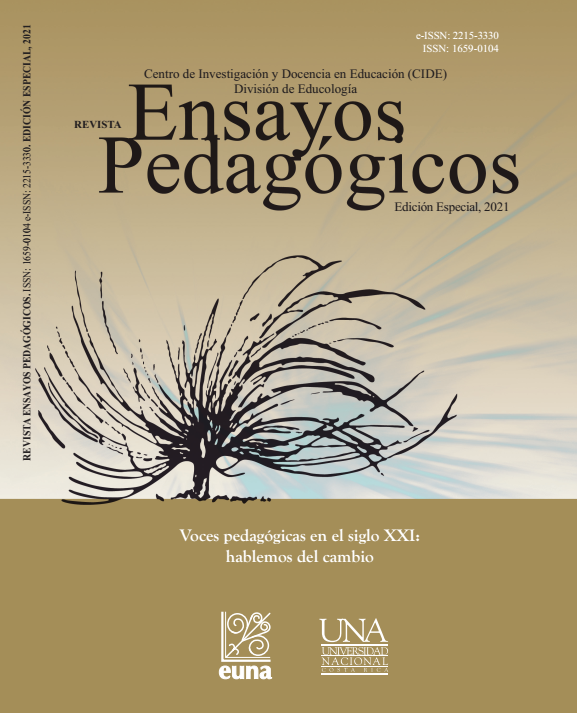University Fine Art Training: From the Exercise of Copying to a Pedagogical Proposal for Emancipation
DOI:
https://doi.org/10.15359/rep.esp-21.2Keywords:
pedagogy, arts, teaching, curriculum, emancipation, higher educationAbstract
This essay reflects, from the personal and professional experience of the author, on the academic and professional training in the area of Arts in the higher education. For this, aspects of the social, political, economic and institutional context in which the experience is framed are contemplated. The approach is carried out from University Pedagogy, which allows to problematize the way in which the curriculum is constituted and develops the teaching in the university arts education. In addition, this essay to propose critical pedagogical alternatives, leading to a decolonial and emancipatory artistic education, which promotes greater involvement of students in the educational process, as well as in the rethinking of current epistemological and pedagogical positions, on which university arts education is based.
References
Acaso, M. (2009). La educación artística no son manualidades. Nuevas prácticas en la enseñanza de las artes y la cultura visual. Catarata.
Acaso, M. (2012). Pedagogías invisibles. El espacio del aula como discurso. Catarata.
Camnitzer, L. (2007a). ¿Es posible la enseñanza del arte? En M. A. Bernal y F. González (Eds.), Antología de textos críticos 1979-2006. ArtNexus/ Arte en Colombia (pp. 38-52). Ediciones Uniandes.
Camnitzer, L. (2007b). La definición restringida de arte. En M. A. Bernal y F. González (Eds.), Antología de textos críticos 1979-2006. ArtNexus/ Arte en Colombia (pp. 74-84). Ediciones Uniandes.
Cerletti, A. (2009). La enseñanza de la filosofía en perspectiva. Eudeba.
De Sousa, B. (2007). La universidad en el siglo XXI: Para una reforma democrática y emancipatoria de la universidad. CIDES-UMSA, ASDI y PLURAL EDITORES.
De Alba, A. (2016). Cultura y contornos sociales. Transversalidad en el currículum universitario. En A. De Alba y A. Casimiro (Coords.), Diálogos curriculares entre México y Brasil (pp. 195-210). IISUE.
Díaz-Barriga, Á. (2003). Currículum. Tensiones conceptuales y prácticas. Revista Electrónica de Investigación Educativa, 5(2), 1-14. http://redie.uabc.mx/vol5no2/contenido-diazbarriga.html
Dussel, E. (2015). Filosofías del sur. Descolonización y transmodernidad. Akal.
Eco, U. (2004). Historia de la belleza. Debolsillo.
Gaillot, B., A. (2013). Artes plásticas. Elementos de una didáctica crítica. ENAP- UNAM.
Martinez, J. (2015). Colonialidad e identidad en América Latina. Casa Editorial Analéctica.
Munari, B. (1981). Como nacen los objetos. Apuntes para una metodología proyectual. Editorial Gustavo Gilli.
Quiceno, H. (2014). Epistemología de la pedagogía. Ediciones Pedagogía y Educación.
Rancière, J. (2003). El maestro ignorante. Cinco lecciones hacia la emancipación intelectual. Laertes.
Sánchez, J. (2016). Arte y currículum: La Escuela de Artes Plásticas de la Universidad de Costa Rica (1897-2015). Revista Humanidades, 6(1), 1-40. https://revistas.ucr.ac.cr/index.php/humanidades/article/view/24963
Saxe-Fernández, J. (2006). Globalización, poder y educación pública. Ensayos críticos. Asociación Espacio Crítico.
Universidad de Costa Rica. (1974). Estatuto Orgánico de la Universidad de Costa Rica. http://www.cu.ucr.ac.cr/normativ/estatuto_organico.pdf
Universidad de Costa Rica. (1995). Políticas y Normas Curriculares para la Actualización de Planes de Estudio. https://www.cea.ucr.ac.cr/images/desarrollocurricular/Politicas-normas-curriculares1.pdf
Vicerrectoría de Docencia. (2007). Resolución VD-R-8126-2007. Universidad de Costa Rica.
Published
How to Cite
Issue
Section
License
Ensayos Pedagógicos is subscribed to the Attribution-NonCommertial-NoDerivatives 4.0 International Creative Commons Licence, which allows both authors and readers to freely download, store, copy, and distribute the final approved publisehd version of the manuscript (post-print) as long as this is done without commercial purposes, no derivative works are generated, and the source and author are mentioned. As well, Ensayos Pedagógicos declares that authors will remain the rightful owners of the copyrights of their work in perpetuity.







